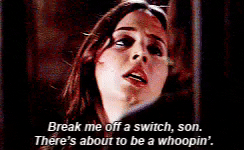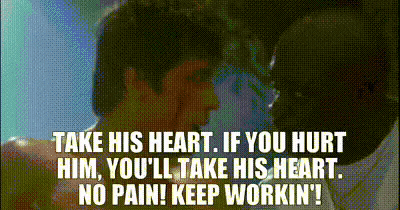DENZIL :
Del, my man!
DEL :
Denzil my son, how are you?
DENZIL :
Come in.
DEL :
Yeah, great.
DENZIL :
I haven't seen you for ages, where have you been?
DEL :
Well, you know me, here, there and everywhere - ducking and diving.
DENZIL :
Rodney, you're looking good!
RODNEY :
Yeah!
DENZIL :
He's cool, I like it!
I tell you, if he wasn't so white I'd swear he was black!
DEL :
Yeah, he is white ain't he!
DENZIL :
He's the whitest man I've ever seen in all my life!
RODNEY :
I'm not ever so white!
DEL :
You are!
You'd make an albino look bronzed!
DENZIL :
(handing out the Red Stripe)
Here, grab one of these each!
DEL :
Oh, here Denzil,
Corinne ain't about is she?
DENZIL :
No, no, she's round her sister's.
DEL :
Oh that's alright
DENZIL :
Hey, you ain't still worried about what happened are you?
Come on Del, she's forgotten all about that now.
Anyway, what brings you round?
DEL :
Just passing through,
thought we'd call in.
'Ere have you had this place done up?
DENZIL :
No.
DEL :
No, I didn't think you had.
DENZIL :
We're getting it decorated soon though.
Corinnes' been at me for ages about it,
but I'm no good at that sort of thing so I got The Irishman to do it.
DEL :
Oh Brendan?
Oh well, you can't go far wrong with him Denzil.
He's a good man.
Here, did you hear about that house he did up in, where was it, Kings' Avenue.
He made a beautiful job of it
so I hear.
Mind you I only saw it after the fire!
Who's a pretty boy?
He's a lovely boy ain't he!
Is he yours Denzil?
DENZIL :
No, he's Corinne's, she's had him for a few years - what fire?
You mean the house burnt down?
DEL :
Yeah, but don't get me wrong, it wasn't Brendan's fault!
I mean, look, I know a lot of blokes who like a couple of pints at dinner time.
And it's very easy to forget where you left your blow-lamp!
DENZIL :
So it was accidental then?
DEL :
Oh yeah! It was an accident,
even the coroner said so!
DENZIL :
Coroner??
DEL :
Yeah.
DENZIL :
Right, that's it, I'm having no drunken Irishman
falling about my living-room with a lighted blow-lamp!
No way.
DEL :
Oh my Gawd, oh I wish I hadn't said nothing now,
oh I feel really bad about this - you know what, with Brendan being a mate an' all!
Look, never mind Denzil.
Look on the bright side, he might not burn your place down.
DENZIL :
Yeah, well I'm taking no chances Del, I'm getting somebody else to do the job!
DEL :
Oh well.
Well, it's up to you.
I mean, as I always used to say to my customers
when I was in the painting and decorating game, I used to say
'It's your money, it's your choice.'
DENZIL :
You never told me you used to be a painter and decorator?
DEL :
Oh yeah, yeah, it's been the family trade for generations ain't it Rodney?
RODNEY :
Eh?
Yeah.
DEL :
There you are, see.
But demand got too much, we had to give it up in the end.
DENZIL :
Listen, couldn't you just do this living room for us?
DEL :
What this?
Oh no, no, no, sorry mate, no, no, you know, we've given the game up now!
DENZIL :
Oh come on Del!
Corinne's been bending my ear about it for ages.
Just this one room yeah?
DEL :
No, no.
No, no, no, no, no, I'm sorry.
If I do it for you I've got to do it for all the others!
Haven't I?
DENZIL :
Del, for a mate in trouble!
Please!
DEL :
Alright, just for you though!
DENZIL :
Cheers Del, you're a pal!
DEL :
I don't know.
I don't know what it is with you.
You manage to twist me right round your little finger, don't you?
DENZIL :
When can you start?
DEL :
First thing in the morning.
A hundred up front, we supply the paint and that's extra.
DENZIL :
Done.
DEL :
And you will be.
DENZIL :
I'll get some more drinks.
DEL :
Good, what about that Rodney, eh Rodney, nice little earner, eh?
RODNEY :
I don't think I'm ever so white!
DEL :
You are.
You look like a blood donor who couldn't say no!
CORINNE,
Wife of Denzil :
Hiya!
Hi hon.
Hello baby, have you missed me?
Denzil!!
What the hell is he doing in my home??
DEL :
Hello Corinne, you look as lovely as ever!
DENZIL :
Del just popped in to say hi hon.
CORINNE,
Wife of Denzil :
Did he really?
'Hello'.
There's the door!
'There's the door.'
DEL :
She's a card ain't she!
CORINNE,
Wife of Denzil :
And what's he doing?
RODNEY :
I want you to tell me the truth Corinne.
Am I white?
CORINNE,
Wife of Denzil :
Denzil - have you and Rodney
been at the funny fags?
DENZIL :
No, honest hon, we haven't,
we've just got some drinks that's all.
CORINNE,
Wife of Denzil :
I go round my sister's to see how she is after having the stitches out,
and I come back to find my home full of.... crazy people!
DENZIL :
Oh come on babe, be friendly!
Del's gonna do the decorating for us!
CORINNE,
Wife of Denzil :
He's what?!
DENZIL :
Well, I blew the Irishman out,
I mean I've heard bad things about him!
CORINNE,
Wife of Denzil :
Denzil, how can you trust this man?
Every time you meet him
you end up drunk or out of pocket?
DENZIL :
Yeah I know, but he's a mate!
CORINNE,
Wife of Denzil :
Would a mate sell you an overcoat like the one he sold you?
DEL :
Oh now, come on, be fair Corinne,
that was a very nice overcoat,
looked like it was made to measure!
CORINNE,
Wife of Denzil :
Yeah, for the Hunchback of Notre Dame!
And what about the time he offered to do the catering or us?
DENZIL :
Oh don't bring that up honey please.
CORINNE,
Wife of Denzil :
That was our wedding Denzil!
What was it we were supposed to have Del?
Lobster vol-au-vents, game pie,
kidneys with saffron rice,
beef and anchovy savouries!
Philadelphia Truffles!
And what did we end up with?
Pie 'n' chips all round!
DEL :
Now I explained all that Corinne, didn't I?
The fridge went on the blink
and all the goodies went manky!
CORINNE,
Wife of Denzil :
And what about our three-tier wedding cake?
DEL :
Yeah, well, that was in the fridge
with all the other gear!
I mean the icing melted,
it dripped everywhere!
RODNEY :
Yeah, yeah, that's true Corinne,
by the end of the week
it looked like a big candle!
DEL :
I thought you said she'd forgotten about all this!
CORINNE,
Wife of Denzil :
How can I forget it?
I have to live with that wedding album the rest of my life.
How many times have you seen a picture of a bride and groom
cutting a jam sponge?
RODNEY :
Oh be fair, Corinne, be fair.
He only got that at the 11th hour,
otherwise it could have been an eccles cake!
CORINNE,
Wife of Denzil :
You want 'em to do the decorating then you let 'em.
But I promise you this Denzil —
If anything goes wrong
I'll make you wish your mother had had a headache the night you was conceived!
[crash]
[something breaks]
DEL :
She's a little Treasure ain't she?
Come on Rodney, let's leave the love-birds alone!
Talking about birds, you just make sure that Buzzby's in the kitchen tomorrow 'cos of the paint fumes.
Leave the key under the mat!
Cheer up Denzil, you know it makes sense!
Come on, let's get out of here.
That'll keep us out of trouble for a couple of days!









